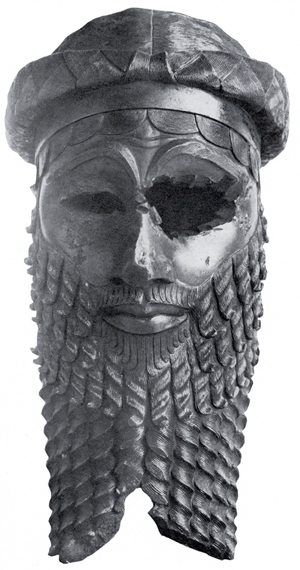Twelve thousand years ago, humans transitioned from hunter-gatherer societies to agriculture-based societies. Humans began to settle in ever larger communities, and gradually created civilizations. Neolithic villages began to flourish in Mesopotamia after 6000 B.C.E., due to its rich soil and water sources (Tigris and Euphrates rivers). The first of the civilizations that developed was the Sumerian. Many other civilizations would follow, including the Akkadian city-states, which would form to the north of the Sumerians.
According to Akkadian legend, a woman of Akkad became pregnant, carrying the illegitimate child of a temple priest. Unable to keep the child, she was forced to set her son adrift in a basket on the Euphrates River, where he was later found by a man named Akki, a gardener for Ur-Zababa, the King of the Sumerian city of Kish.1
This child would come to be Sargon of Akkad (Sargon the Great). He would grow to one day usurp the kingship of his own city of Agade, which would come to be the capital of his empire. After developing his Akkadian city of Agade and building a strong military, after 2350 B.C.E., he began to conquer. Many city-states located around Mesopotamia were involved in trading and attempting to aid one another, which often led to conflicts and war. Sargon used his army to bring these small conflicts to an end by conquering each Sumerian city-state one by one. He was viewed as a talented administrator and brilliant warrior. Sargon was wise in going on the offensive against the Sumerian city-states, conquering each, destroying all their defensive walls, as well as any enemy who stood before him. His empire is thought to have included most of Mesopotamia and parts of the Levant, besides incursions into Hurrite and Elamite territory, making him the founder of the Old Akkadian Dynasty as well as the first Mesopotamian Empire. The Old Akkadian Dynasty ruled for about a century after his death, until the Gutian conquest of Sumer. Historians believe that the Gutians were tribes of mountain people who, combined with the revolting people of the various conquered cities, were responsible for the downfall of the Akkadian Empire around 2150 B.C.E. .2
As the first emperor in history, Sargon of Akkad had much success. Despite having no prior example to follow, he was able to take over and maintain Mesopotamia for over fifty years. He financed his empire by seizing control of trade routes, taking all goods that crossed through his realm. This allowed his capital of Akkad (or Agade) to become the wealthiest and most powerful city in the world. He was able to maintain his empire by placing his best and most trusted men in positions of power in various cities. They would be appointed by Sargon himself to serve as governors and administrators in over 65 different cities. These leaders were referred to as the “Citizens of Akkad” in later Babylonian texts. Anytime Sargon took over a city, it rapidly became an Akkadian stronghold, full of Akkadian officials and troops.3 This stability throughout the empire allowed the construction of roads, a wider influence of trade, improved irrigation, as well as developments in arts and in science. Sargon standardized weights and measures for trade and daily commerce. He also managed to initiate a system of taxation and created the first postal system.

These various improvements to the lives of the people of Mesopotamia were not enough to prevent the various conquered peoples from gathering to rebel against Sargon and his administration. Being forced to stay under the rule of an emperor who defeated various groups, taking their land and goods, fueled the people to rebel. By 2150 B.C.E., the Akkadian Empire had collapsed in the midst of rebellion from within and from outside invaders attempting to take the fertile land of Mesopotamia. The story of Sargon loosing his empire to inside rebellion is only one of many. When a group of conquered people are forced to live under another’s rule, it is common for them to look for ways to strike back, overthrow those kings who often attempt to rule them well. Later rulers would improve Sargon’s administrative techniques by relying on centralized bureaucratic rule and regular taxation.4
Sargon created the very first political entity on a large scale and set the standards for all future rulers of empires. Through his unique upbringing, never meeting or knowing his parents, he was able to rise to power. Initially he was nothing but the king’s cupbearer (a butler); none expected that he would one day come to conquer and maintain the land wanted by all. Sargon of Akkad would become the topic of legendary narratives in later Assyrian and Babylonian literature, focusing on his rise to power from humble origins and his conquest of Mesopotamia. These memories of his successful deeds would later inspire conquerors to follow his example and would provide all the future people of Mesopotamia with a powerful hero to idolize.
- Ancient History Encyclopedia, September 2009, s.v. “Sargon of Akkad,” by Joshua J. Mark. ↵
- Ancient History Encyclopedia, September 2009, s.v. “Sargon of Akkad,” by Joshua J. Mark. ↵
- W. F. Albright, “A Babylonian Geographical Treatise on Sargon of Akkad’s Empire,” Journal of the American Oriental Society, Vol. 45 (1905): 193-201. ↵
- The Macmillan Encyclopedia, 2003, s.v. “Sargon of Akkad,” by Alan Isaacs. ↵



51 comments
Kiana Contreras
I am now learning about Sargon of Akkad in my current class. What I didn’t know is how initially Sargon had been found, from a basket which almost sounds fictional, and lucky! of being found by the gardener for Ur-Zababa. Also, it’s fanatical how he managed to maintain Mesopotamia not to mention for over 50 years. Great article, enjoyed reading more from Sargon of Akkad.
Francisco Cruzado
It surprises me how natural it seems for the first emperor Sargon to develop political institutions that would later on be sort of normalized by the empires that followed in the Middle-Easter and Western Asia regions. It seems as if there was a regional construction of the idiosyncrasy, as if politics and the mastering of government developed through time, through various attempts of theorizing those concepts. The similarity with Noe’s origins also surprise me a lot. Would it be possible that such mythical origin was, instead of a mere coincidence, a literary construct (with a meaning and/or symbolism in itself)?
Kasandra Ramirez Ferrer
I think this a very interesting article but it did make me wonder if Sargon’s tale is true. I think he was an outstanding leader who was interested in his people and was able to improve his empire with his bright ideas that made it grow rich and powerful quickly. It also made me compare his story to Moses’s, how both were put on a river and ended up with royal guardians, they also became royalty, one was an emperor and the other one a prince.
Aaron Peters
What an informative and well written article! I’m surprised at the size of the land he controlled, especially since it was done in ancient Mesopotamia, before most modern methods of transport were in use. It’s pretty wild to think that someone with such a troubled past would rise and become one of the planet’s first emperors, writing his name in the History books forever.
Noah Wesolowski
After reading this article it’s amazing that Sargon of Akkad was able to introduce so many great ideas to his empire which allowed it to quickly grow rich and powerful. Standardizing the weight system helped trading become easier and introducing a tax helped fund building irrigation systems in the area that he conquered. Unfortunately his great empire came to an end when the cities he conquered started to rebel.
Diego Terrazas
I wonder if Sargon’s tale was true. Perhaps that story was insinuated so that he seemed more like a hero to his people. Nevertheless, Sargon set the standard for conquerors, which I do not know to call a good or bad thing, but there must be a first for everything I guess. However, his establishment of a tax system and a government is pretty impressive.
Sharriah Martinez
I truly enjoyed reading this article on Sargon of Akkad. It was very interesting to learn of his adverse upbringing, and to follow how he was able to overcome this and rise to power. It is crazy to consider that he was the very first successful emperor, he truly set the standard for many conquerors who followed him. Thank you for this very insightful article filled with information that was new to me.
Engelbert Madrid
Sargon of Akkad’s story is quite interesting, because he’s basically the first super hero story that was written. Furthermore, his birth story is quite the same as the story of Moses, who freed the people of God from the Egyptian kingdom, which is interesting to know. Some historians believe Moses birth story was mixed with Sargon’s, but no one knows for sure. I enjoyed this article. Thanks for writing this article.
Kristy Feather
I am always fascinated by ancient histories, so I really enjoyed how this article went way back into ancient societies to discover more about Sargon the Great and his kingdom of Agade. I had never heard about it and really found it interesting how this society would establish a political foundation for the future.
Mariah Garcia
Sargon the Great endured a lot growing up. He was abandoned yet he had to conquer the city he was born in, city of Agade. He was a very intellectual emperor that created complex systems that controlled many cities and initiated a taxation system. It was very interesting to read because Sargon lead the first empire for many years. This is like an old and forgotten story, but it shouldn’t because Sargon changed the world.